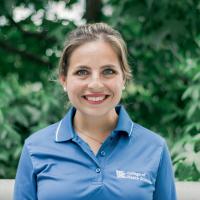HHS student draws on her heritage to pursue health solutions in populations facing adversity
Parisa ShamaeiZadeh, a human health sciences senior and UK College of Health Sciences student ambassador, has seen firsthand how cultural differences can shape health care outcomes. Now, she wants to study how the intersection of cultural/community health with individual health can impact a variety of populations facing adverse circumstances.
“As an Iranian-American I grew up in two cultures. My parents divorced when I was young, so I traversed the line between my mother’s Appalachian upbringing and my father’s Iranian heritage,” she said. “I began to grasp the concept of “culture” as a child and it was an interesting course for me. I felt some of the issues that immigrant-raised children faced even though I was born and raised in the United States. Seeing the challenges my father experienced due to his immigrant status is what drove my passion to understand how culture affects health.”
According to ShamaeiZadeh, there are many barriers that can have dire health consequences for immigrants: lack of knowledge of a new country’s health care system, language difficulties (even with the presence of interpreters), financial barriers, and cultural practices all play a part in how health care is accessed and delivered.
“As a practitioner, I want to use the unique knowledge of ‘community health’ and ‘individual health’ to impact populations experiencing adversity such as violence against women in South Africa, gun violence in Mexico, and women’s health concerns in Muslim-majority countries,” ShamaeiZadeh continued. “When medical professionals better understand how cultural and environmental issues intersect with the identity of the patient, we can then provide better care.”
ShamaeiZadeh’s father experienced a stroke in 2014 which only furthered her interest in health care. “My father was also a physician, yet he suffered a stroke and is now disabled for life,” she said. “It really struck me that we take our health for granted; we complain about getting up, getting out of bed, going to school, etc., but it’s something that not all of us can do.”
Her father’s stroke, and the fast-acting medical professionals who saved him, inspired ShamaeiZadeh to first forge a path in emergency medicine. However, a more solidified plan began to develop quickly within the walls of ShamaeiZadeh’s small-town high school. “I knew I wanted to go to medical school, but I didn’t necessarily want to study biology,” she said. “I was more interested in the clinical side of medicine—working with the patients themselves—so I began searching for more holistic programs.”
The College of Health Sciences’ human health sciences program appeared to be the perfect fit for her with its emphasis on interdisciplinary collaboration and opportunities for undergraduate clinical experiences.
Around ShamaeiZadeh’s sophomore year, her pre-med plans began to shift. Instead of poring over med school applications, the now-senior fell in love with global health case competitions. “They’re designed to mimic the work of a health professional attempting to combat a global health issue,” she explained. “I loved everything about it.”
“I’m trying to merge the two worlds now,” she continued. “I’m applying for my master’s degree in national health and global health studies, and then I’m going to apply to medical school. Even though I’m not sure what my career will be, I’ll incorporate both of these fields into my life.”
ShamaeiZadeh encourages others to be more flexible when considering their future as well. “When I started college, I said, ‘This is it, this is my plan, and I’m going to do it,’ and we’re so afraid of failure,” she said. “We don’t want to screw up our future. But if you have a crazy idea that might change your life for the better, than you should just do it. You just have to leave the fear behind and keep moving forward.”
